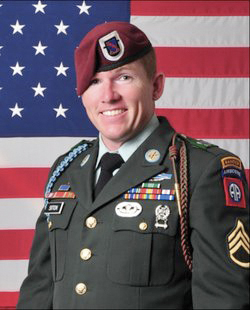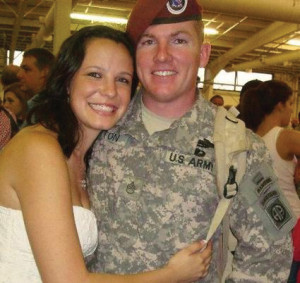A hero lost, but not forgotten

Courtesy of Fox.com
On June 4, 2012, Staff Sergeant Matthew Sitton, a soldier deployed in Afghanistan bravely wrote a letter that would forever change the lives of many, and brought the dangers of the war in Afghanistan to congress’ front door.
In a career where deviating from the chain of command is not allowed, SSG Matthew Sitton took a risk and wrote a letter to Rep. C.W. Bill Young (R-Fla.). In his letter, Sitton detailed the reckless and dangerous situations that he and his fellow soldiers who were deployed with the 4th Brigade Combat Team in support of Operation Enduring Freedom in Afghanistan were enduring.
Weeks after the letter was sent, on August 2, 2012, Sitton and First SGT Russell Ryan Bell were killed by an improvised explosive device, or IED, in Zharay, Kandahar Provence, Afghanistan.
Some of the most powerful excerpts from his letter include him stating “I feel myself and my soldiers are being put into unnecessary positions where harm and danger are imminent. I know the threat of casualties in war and am totally on board with sacrifice for my country, but what I don’t agree with is the chain of command making us walk through, for lack of a better term, basically a mine field on a daily basis.”
The letter goes on to give haunting details about the patrols they were assigned to do without any explanation given to them by the chain of command. “As a Brigade, we are averaging at a minimum an amputee a day from our soldiers because we are walking around aimlessly through grape rows and compounds that are littered with explosives.”
His letter also stated that his 25 man platoon was doing the job of 40 men, and that conditions had become extremely unsanitary. He detailed the breaking of a dam that flooded the sewage in his barracks, and that since his chain of command is so set on conducting the seemingly pointless patrols, many soldiers were forced to conduct their patrols in sewage soaked gear. These conditions caused illness and infections in the soldiers.
He adds, “I’m concerned about the well being of my soldiers and have tried to voice my opinion through the proper channels of my own chain of command only to be turned away and told that I need to stop complaining.”

In the wake of Sitton’s death, people have begun looking to the military for answers, and were not happy with the responses they received. Sitton’s mother, Cheryl Sitton, discovered that the commanding officers that sent her son to his death would be reassigned once back in the states. “That’s not fixing the problem. That’s moving the problem,” Sitton told the Tampa Bay Times. “Now that these guys aren’t going to be putting Matt’s men’s lives in danger, they’re going to be putting some other guy’s lives in danger.” Following the scandal involving Jill Kelley and General John Allen, many families just like Sitton’s began to be angry and upset at the thought of how distracted the military’s top leaders had become. “To most of the people up high, they’re just numbers. To all of us down here at the infantry level, down at the enlisted level, they’re all individual people. They’re people, dying. Not just numbers,” Sarah Sitton, told FOX News last November.
After receiving Sitton’s letter, Bill Young, who had always been a supporter of the war in Afghanistan, quickly changed his stance. Young began calling for the troops to come home immediately, causing his fellow Republican leaders rethink the war as well. Young stood before Capitol Hill and read the letter aloud, a battle cry or call to action for his fellow leaders to see the men dying as men dying, not just numbers.
“I can’t find a whole lot right about what’s happening in Afghanistan,” Young said during a 2012 congressional hearing. Due in part to his congressional influence on budget, Young had a lot of pull with top military leaders, and he had not been afraid to begin calling in favors to change the things that are happening to our soldiers. He began lobbying to appropriate more funds for research and technology that will take soldiers away from coming into contact with IEDs. However, Young died on October 18, 2013.
“This is a big army and change coming about takes a lot of work. All in all what happened wasn’t wrong, it was more of a direct problem with command,” Sitton added in a recent interview. “That has since changed and yes, we are happy with the changes that were made even if it wasn’t much. When Young got the letter he was being very discreet about it because the letter could have cause problems for my husband’s career, so he did truly everything he could as the times changed,” Sarah said.
When Sitton was killed, he left behind a 9-month-old son, Brodey Sitton, and a wife, Sarah Sitton, who also has been searching for answers and trying to stay strong. “I have been on an exhausting year long journey and learning how to cope with my tragedy and move forward with life,” she said. After learning of her husbands death, Sitton urged the community with the help of local news to come show support for her husband and his amazing acts of bravery. Proudly wearing his dog tags, she was a pillar of strength at a press conference held at the Ybor City police station nearly a year ago.
“I have learned things in life I wish I never would have experienced at such a young age. I am in a much better place now than I was a year ago when the news was told to me. I have had my ups and downs and still do,” she said. “I have had an amazing support system and a best friend that I wouldn’t change for anything (My best friend [Latoya Bell] and I lost our husbands together that day). Having someone to take this journey with helps you more than you ever truly realize. It’s been a learning and growing process for me. It’s been a life changing experience that will never leave me and forever change me.”
Sitton is now able to offer advice to other military spouses going through what she has had to go through. “Find those who are in the same situation as you. They are the only ones who can truly understand the way you feel and can relate to you. Also make sure you talk about everything. The more you talk it out, the better you feel.”
“We do not resent the military in anyway. My husband had a very dangerous job and we knew this could be an outcome of that job. The military has been very, very good about taking care of the their gold stars. We can’t blame the army for something that my husband chose to do and loved to do. We had felt that it could have been avoided if the command would have cared a little more about their own soldiers, but it was the job they were given and they accepted it,” she said.
The Sitton family has been on a heart breaking journey that has shown how strong the human spirit is, and how much of a difference one person can make. While congress has been slow to act on many things, and the president’s plan to withdraw the troops by 2014 seems not to be going into effect, the letter written by Matthew Sitton will forever haunt the minds of many, and will continue to prompt change for years to come.
For Sarah Sitton and her family, she just wants her husband to be remembered for the hero that he is. “My husband was a very good man, amazing husband and loving father who loved his job and serving his country. He wanted to protect his men first and foremost.
He succeed in his letter when he wanted his men home safe because they made it. He would have done anything for his brothers to the left and right of him.”
Krista Byrd is the Editor-In-Chief of The Hawkeye.
Krista Byrd was born in Brandon, Florida. She is currently working on her Associates degree in...







Sabrina Diaz • Nov 11, 2013 at 8:38 pm
I feel hurt for the families across our country that have to deal with this. This story is tragic. I ca’t wait for the war to be over. These children that have lost their fathers and the wives that have lost their husband. God bless America.
Lacey Holeman • Nov 11, 2013 at 6:29 pm
Wow, what a great story. I thank Sergeant Matthew Sitton and the rest of our troops this Veteran’s Day. If only the letter could have stemmed a reaction quicker, he may still be alive today. It is with great respect and appreciation that I write this post. I wish Sarah Patton and her family peace with this loss. Hopefully this causes some higher in the chain command to reevaluate the safety of their troops. Every troop’s life counts, and it should not be measured in a grand scale in numbers.
Nicole Garofalo • Nov 8, 2013 at 7:31 pm
This story is very touching. It is so sad to see all the people that suffer from someone’s death. The worst of all is that Sergeant Matthew Sitton wrote on his letter that it was unnecessary to be in the positions they were being put into. Not only was his life cut short, but he left behind a family, including a 9-month-old son.
On another note, good job on this article Krista. I really felt connected to the people that were affected by his death. May he rest in peace.